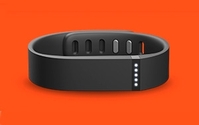technology
Fitbit Holds Lead Among Fitness Wearables
- by Aaron Baar , August 29, 2014

Good luck catching up with Fitbit in the wearable fitness tracker category.
According to new research from Parks Associates, Fitbit commands nearly 40% of the digital fitness tracker market, far ahead of competitors such as Samsung (14%), Nike + Sensor (14%) and Nike Fuelband (8%).
“Fitbit has been around for the last seven, eight years. It’s not an overnight success,” Harry Wang, director of health and mobile research at Parks, tells Marketing Daily. “The consumer needs to be aware of what’s out there. The timing was right for them.”
Indeed, Fitbit’s market lead is so commanding, it’s unlikely any singular-use fitness device could erode it significantly. More likely, the competition will come from outside the fitness category with products such as smart watches, smart jewelry and wireless-enabled patches (that go directly on the skin) that have fitness tracking included as part of their multi-functionality.
advertisement
advertisement
“Trackers from other categories or smart watches can be another form-factor in challenging the stand-alone fitness trackers,” Wang says. “If you’re looking from a cannibalistic category perspective, [competition is] going to be from a smart watch or other, less-visible product.”
The smart watch category is one likely to see intense growth in the coming years. Only 2% of broadband-using households purchased a smart watch last year, though another 4% said they were very likely to purchase one within the next year. The category is due for a shakeup, with numerous reports suggesting Apple will announce its own smart watch in September.
According to the firm’s survey of more than 5,000 U.S. broadband households, only about 6% of them have a digital pedometer or fitness tracker. Connected trackers, which can upload information wirelessly, will account for 52% of all digital tracker sales in 2014, and will climb to 81% by 2018.


